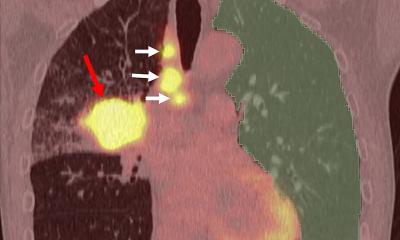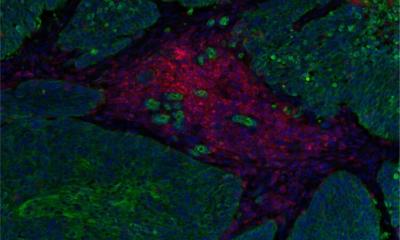Medical nanoparticles
Local treatment of lung cancer
Nanoparticles are extremely small particles that can be modified for a variety of uses in the medical field. For example, nanoparticles can be engineered to be able to transport medicines specifically to the disease site while not interfering with healthy body parts.
The Munich scientists have developed nanocarriers that only release the carried drugs in lung tumor areas. The team headed by Silke Meiners, Oliver Eickelberg and Sabine van Rijt from the Comprehensive Pneumology Center (HMGU), working with colleagues from the Chemistry Department (LMU) headed by Thomas Bein, were able to show nanoparticles' selective drug release to human lung tumor tissue for the first time.
Tumor tissue in the lung contains high concentrations of certain proteases, which are enzymes that break down and cut specific proteins. The scientists took advantage of this by modifying the nanocarriers with a protective layer that only these proteases can break down, a process that then releases the drug. Protease concentrations in the healthy lung tissue are too low to cleave this protective layer and so the medicines stay protected in the nanocarrier.
"Using these nanocarriers we can very selectively release a drug such as a chemotherapeutic agent specifically at the lung tumor," reports research group leader Meiners. "We observed that the drug's effectiveness in the tumor tissue was 10 to 25 times greater compared to when the drugs were used on their own. At the same time, this approach also makes it possible to decrease the total dose of medicines and consequently to reduce undesirable effects."
Further studies will now be directed to examine the safety of the nanocarriers in vivo and verify the clinical efficacy in an advanced lung tumor mouse model.
Source: Press release Helmholtz Center Munich - German Research Center for Environmental Health
06.03.2015





